Freedom of speech does not mean law of the land can be violated, says complainant
9 and 10912 Sunday and Monday LESSON 696 - மூன்று கூடைகள் திபிதக![]() TIPITAKA from FREE ONLINE eNālāndā Research and Practice UNIVERSITY through http://sarvajan.ambedkar.org
TIPITAKA from FREE ONLINE eNālāndā Research and Practice UNIVERSITY through http://sarvajan.ambedkar.org
Dhammapada Verses 338 to 343 Sukarapotika Vatthu-Verse 338. Craving Uneradicated Brings Suffering Over and Over-Verse 339. Caught In The Currents Of Craving-Verse 340. The Creeper of Craving-Verse 341. Bliss Does Not Come Through Craving-Verse 342. The Bonds That Entrap MenVerse 343. Nibbana By Shunning Craving
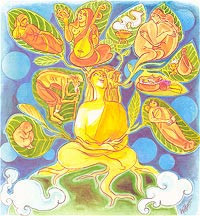 |
Verse 338. Craving Uneradicated Brings Suffering Over and Over
Explanation: Even when a tree has been cut down, it will grow |
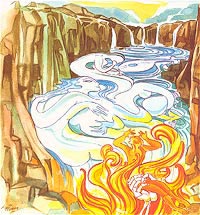 |
Verse 339. Caught In The Currents Of Craving
Explanation: If in a person the thirty-six streams flow strongly |
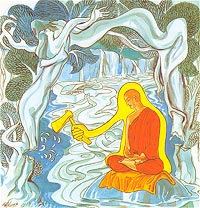 |
Verse 340. The Creeper of Craving
Explanation: The streams of craving flow towards objects everywhere. |
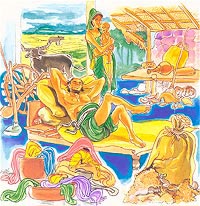 |
Verse 341. Bliss Does Not Come Through Craving
Explanation: Craving arises in people like flowing streams. |
 |
Verse 342. The Bonds That Entrap Men
Explanation: Surrounded by craving the masses tremble like |
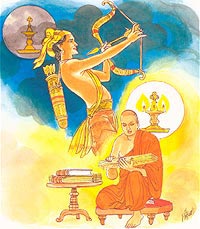 |
Verse 343. Nibbana By Shunning Craving
Explanation: Surrounded by craving the masses tremble like |
Dhammapada Verses 338 to 343
Sukarapotika Vatthu
Yathapi mule anupaddave dalhe
chinnopi rukkho punareva ruhati
evampi tanhanusaye anuhate
nibbattati dukkhamidam punappunam.
Yassa chattimsati sota
manapasavana bhusa
maha vahanti dudditthim
sankappa raganissita.
Savanti sabbadhi sota
lati uppajja titthati
tanca disva latam jatam
mulam pannaya chindatha.
Saritani sinehatani ca
somanassani bhavanti jantuno
te satasita sukhesino
te ve jatijarupaga nara.
Tasinaya purakkhata paja
parisappanti sasova bandhito
samyojanasangasattaka
dukkhamupenti punappunam ciraya.
Tasinaya purakkhata paja
parisappanti sasova bandhito
tasma tasinam vinodaye
akankhanta viragamattano.
Verse 338: Just as a tree with roots undamaged and firm grows again even
though cut down, so also, if latent craving is not rooted out, this dukkha (of
birth, ageing and death) arises again and again.
Verse 339: That man of wrong views, in whom the thirty-six streams (of
craving) that flow towards pleasurable objects are strong, is carried away by
his many thoughts connected with passion.
Verse 340: The stream of craving flows towards all sense objects; the creeper
of craving arises (at the six sense-doors) and fixes itself (on the six sense
objects). Seeing that creeper of craving growing, cut off its roots with Magga
Insight.
Verse 341: In beings, there flows happiness that is smeared with craving;
those beings attached to pleasure and seeking pleasure are, indeed, subject to
birth and ageing.
Verse 342: People beset with craving are terrified like a hare caught in a
snare; held fast by fetters and bonds they undergo dukkha (round of rebirths)
again and again, for a long time.
Verse 343: People beset with craving are terrified like a hare caught in a
snare. Therefore, One who wishes to free himself from craving should eradicate
craving.
The Story of a Young Sow
While residing at the Veluvana monastery, the Buddha uttered Verses (338) to
(343) of this book, with reference to a young sow.
On one occasion, while the Buddha was on an alms-round at Rajagaha, he saw a
young dirty sow and smiled. When asked by the Venerable Ananda, the Buddha
replied, “Ananda, this young sow was a hen during the time of Kakusandha
Buddha. As she was then staying near a refectory in a monastery she used to hear
the recitation of the sacred text and the discourses on the Dhamma. When she
died she was reborn as a princess. On one occasion, while going to the latrine,
the princess noticed the maggots and she became mindful of the loathsomeness of
the body, etc. When she died she was reborn in the Brahma realm as a puthujjana
brahma but later due to some evil kamma, she was reborn as a sow. Ananda! Look,
on account of good and evil kamma there is no end of the round of
existences.”
Then the Buddha spoke in verse as follows:
|
Verse 338: Just as a tree with roots undamaged and |
|
Verse 339: That man of wrong views, in whom the |
|
Verse 340: The stream of craving flows towards all |
|
Verse 341: In beings, there flows happiness that |
|
Verse 342: People beset with craving are terrified |
|
Verse 343: People beset with craving are terrified |
VOICE OF SARVAJAN
ADW goof-up stalls Scheduled Caste scholar’s UK programme
A Scheduled Caste (SC) student who has made it to a premier educational
institution in the United Kingdom has been denied scholarship after
being awarded one by the Adi Dravidar Welfare (ADW) Department. This has
come as a dampener at a time when SC/STs are slowly moving forward and
have started to enter the upper echelons of higher education.
K.
Saravanan is a scholar selected by the School of Chemistry, University
of Manchester, for Ph.D. research with a fellowship awarded by the
department under a scholarship scheme for SC students for studying in
universities abroad.
He was selected for the
scholarship in 2009 (November 19, 2009), according to the documents
obtained through the Right to Information Act. The scheme supports SC
students for four years.
After his interview in 2009,
he was declared successful and given confirmation letter to proceed for
higher studies. However, until now, the ADW Department has not released
any funds. The aspiring candidate was shocked to know that his
scholarship was cancelled due to insufficient funds, after he had joined
the course.
Mr. Saravanan was chosen for the
fellowship by the competent authority and his proposal went through an
elaborate process. The University of Manchester admitted him to the
Ph.D. Programme in Drug Discovery only after a rigorous test and
discussion.
On November 19, 2009, the ADW Department
held the interview for scholarship and Mr. Saravanan was one among the
two candidates selected for the SC student foreign scholarship.
According
to the endorsement letter issued by ADW Commissioner P. Sivasankaran,
Mr. Saravanan was provisionally selected for the overseas fellowship
scheme. Mr. Sivasankaran had sent a letter to the Head, School of
Chemistry, University of Manchester, that the government of Tamil Nadu
would cover tuition fees, maintenance allowance, and contingency
allowance of Mr. Saravanan.
Meanwhile, Mr. Saravanan was asked to join the university after producing the award letter.
The
ADW Department, in a letter, had advised him to proceed with his visa
formalities and asked him to join the course, making financial
arrangements on his own, as it might take some time to get the
administrative approval. As he was not in a position to mobilise the
required funds, he had waited for the release of funds.
During
2011, on the request of ADW Department, again Mr. Saravanan submitted
the admission letter and the approval was sought for the release of
funds. On the belief that he would be awarded the scholarship, Saravanan
got his visa to UK and proceeded on his journey by borrowing money from
relatives, friends and teachers.
The ADW
Commissioner again wrote to Prof. Whitehead requesting that Mr.
Saravanan could be allowed to join the University of Manchester to
pursue Ph.D.
However, the Secretary wrote to the ADW
Commissioner that the time period to get the fellowship had been closed
for the said financial year (2011-12) and also no sufficient funds were
available. But, in an earlier case, the first awardee got the funds
released after he joined the course in a university in UK, says Mr.
Saravanan.
The information collected through RTI Act
states that ADW Minister, N. Subramanian, had rejected his application
on the ground that the candidate had not joined the said programme in
September 2011. But Mr. Saravanan contends that the Department had sent
the relevant files only in September 2011 to the Principal Secretary
(Finance) and Chief Secretary, who signed the files in December 2011.
Appeal to Chief Minister
The
RTI documents reveal that ADW Department had goofed up the whole issue
as it had misquoted the tuition fee as 7,000 pounds, though Mr.
Saravanan had clearly mentioned it as 17,000 pounds. The ADW Department
cited it as a typographic error. As a last resort, he has written to the
Chief Minister’s special cell seeking justice. He is awaiting a
favourable order from Chief Minister Jayalalithaa.
Says complainant: Trivedi’s cartoons insult Constitution
Twenty-seven-year-old Amit Arvind Katarnaware, who filed the complaint against cartoonist Aseem Trivedi, told
The Hindu
that he was offended by the insult to the Constitution and to the Ashoka
pillar. The pillar is the symbol of Emperor Ashoka, who is revered by
Buddhists. A Central Railway employee, he said he did not belong to any
political party and was an independent activist who fought for human
rights.
His complaint also names Anna Hazare, Arvind Kejriwal and others from the IAC, but the main culprit is [Mr.] Trivedi, he stated.
A
third-year student of Legal Sciences and Law at a Navi Mumbai college,
Mr. Katarnaware said everyone had a right to protest, but freedom of
speech cannot violate the law of the land.
Mr. Trivedi could not be
found and it was only 20 days ago that his location was tracked through
his mobile phone.
One of the
cartoons depicts the “Gang Rape of Mother India” where a politician, a
bureaucrat and a devil symbolising corruption are seen standing around
‘Mother India,’ as the politician is saying “come on hurry up.”
Another
cartoon titled ‘New National Symbols’ shows the Ashoka Pillar with
three wolves, their jaws dripping blood with the caption “Wolfs with the
sign of Danger.”
Another cartoon depicts 26/11 terrorist
Ajmal Kasab as a dog, urinating on the Constitution of India and in
another Parliament is depicted as a giant toilet bowl. Mr. Trivedi has
critiqued the national bird too, showing it as a vulture, while the
national animal is dubbed “netasaur”.
Mr. Trivedi has
been charged with sedition, a non-bailable and cognisable offence under
Section 124 of the Indian Penal Code, for which he can imprisoned for
life and fined, or with imprisonment that may extend up to three years.
He can also be punished for upto three years and fined under section 2 of the prevention of insult to National Honour Act 1971 which punishes , “whoever in any public place or any other place w ithin public views burns, mutilates, defaces, defiles, disfigures, destroys, tramples upon or otherwise shows disrespect to or brings into contempt (whether by words, either spoken or written, or by acts) the Indian National Flag or the Constitution of India or any part thereof.”